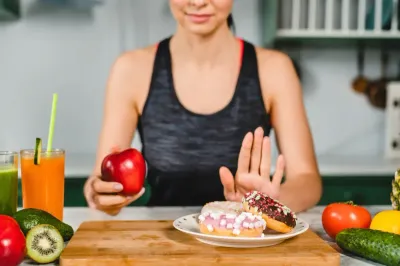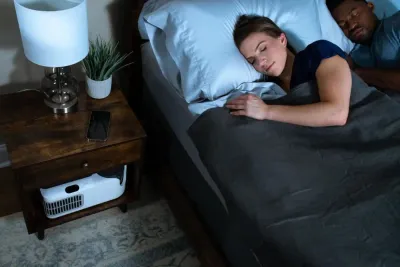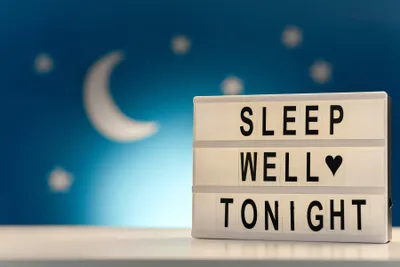
Key Takeaways
- Sleep-Supporting Foods: Tryptophan-rich foods like turkey, bananas, and oats can naturally promote better sleep by boosting melatonin and serotonin production.
- Caffeine Awareness: Coffee, chocolate, and even some teas can disrupt your ability to fall and stay asleep, especially when consumed in the afternoon or evening.
- Sugar and Sleep: High-sugar foods and refined carbs may lead to blood sugar spikes and crashes, which can interfere with restful sleep.
- Heavy Meals: Eating large or high-fat meals late at night can cause discomfort and digestive issues, making it harder to fall asleep.
- Alcohol Impact: While alcohol may initially make you drowsy, it can fragment your sleep and reduce time spent in REM sleep.
We all know that sleep plays a pretty big role in our health, but are you aware that what we eat can impact our sleep?
It's true! There are many factors, including certain foods can disrupt your body's natural sleep processes, resulting in restless nights and waking up feeling groggy. This is definitely not how you want to start your day.
We'll walk you through some of the foods we often enjoy that can actually disrupt your sleep, and explain why they have that effect. Plus, we'll touch on what foods keep you awake at night so you can make better for getting a good night's sleep.
Save Up to $710! Cooler Nights, Better Sleep
While avoiding certain foods can help improve your sleep, don't overlook the impact of sleep temperature. Experience personalized sleep temperature with the Chilipad.
Avoid These Sleep-Disrupting Stimulants
Avoid caffeine and alcohol, especially in the evening, because both can impact your sleep.
Caffeine
Some of our favorite foods have caffeine with out knowing it. They include foods such as chocolate, certain baked goods, drinks, and energy bars. While they might give you a quick energy boost in the afternoon, they can also make it harder to fall asleep and stay asleep.
Did You Know: Caffeine consumption can lead to more frequent rapid eye movement (REM) occurrences (and less time spent in Deep Sleep). This is why might feel groggy in the morning. [1]
Steer clear of foods with caffeine, especially at night. Try caffeine-free options instead, or wind down with calming activities, which can help you sleep better.
Even the slightest amounts of caffeine can affect sleep. So, be mindful of your consumption, especially in the late afternoon and evening.
How Caffeine Disrupts Sleep:
- Increases Alertness: Caffeine increases alertness and delays sleep onset, making it difficult to fall asleep at your usual bedtime.
- Reduces Quality: Even if you fall asleep, caffeine can diminish the quality of your rest, resulting in lighter and less restorative sleep.
- Extends Latency: Consuming caffeine in the late afternoon or evening can increase the time it takes to fall asleep, known as sleep latency.
- Fragmented Sleep: Caffeine's stimulant effects can cause more frequent nighttime awakenings, leading to restless sleep and keeping you awake at night.
Did You Know: We've highlighted the best foods to help your mind and body relax before bedtime. Some foods include cottage cheese, tart cherries, turkey, and more.
Sugary Foods and Snacks
Be cautious of hidden sugars! Nowadays, sugar is almost everything, from your favorite breakfast cereals to yogurt and even in some energy bars. These foods and snacks with high levels of added sugars can stimulate your mind, resulting in a difficult time falling asleep.
This can potentially lead to insomnia and other common sleep disorders. It’s best to avoid them a few hours before bedtime.
Did You Know: A 2020 study found a clear connection between high-glycemic foods and insomnia in postmenopausal women over a three-year span.
How Sugar Impacts Your Sleep
High sugar levels cause quick energy spikes followed by fast crashes. This fluctuation can make it difficult to fall asleep. Typically, it can result in frequent awakenings and restless sleep, leading to you having a groggy day.
Having sugar late in the evening can make it difficult to relax and wind down. I'm not saying you shouldn't enjoy these foods, I'm suggesting that you keep a close on your sugar intake, especially close to bedtime.
- Energy Spikes and Crashes: The quick energy boost from sugar is often followed by a sudden drop, leading to fatigue and potential nighttime wake-ups.
- Restlessness: Sugar can increase brain activity and interfere with the release of melatonin, the hormone responsible for regulating sleep, making it harder to relax and fall asleep.
- Increased Wakefulness: Consuming a large amount of sugar before bed can lead to poor sleep.
Related Blog: Exploring Common Sleep Disorders: Symptoms and Treatments
Sugary Food Alternatives:
Choose healthier alternatives that provide energy without the sugar crash.
- Fruits
- Whole Grains
- Naturally Sweetened Snacks
Opting for these foods before bed can help your body’s natural sleep processes.

High-Fat and Fried Foods
High-fat foods include fast food, fried items, and high-fat dairy products. They usually contain unhealthy fats, such as trans fats and saturated fats, commonly found in burgers, fried chicken, French fries, pizza, full-fat cheese, and ice cream.
While cheese is commonly considered a comfort food, it is actually one of the worst foods to eat before bed, including Cheddar, Swiss, Parmesan, blue cheeses, and gorgonzola, as they contain tyramine.
This can impact your body by increasing the release of norepinephrine, a neurotransmitter that can stimulate brain activity and elevate blood pressure. [2]
Impact on Sleep:
Eating high-fat and fried foods late in the evening can keep you awake at night. Next time you watch a ballgame, consider other healthy alternatives. The high-fat impacts your digestion and comfort, making you toss and turn throughout the night.
- Challenging to Digest
- Causes Discomfort
- Triggers Acid Reflux
- Disrupts Sleep Stages
Healthy Alternatives
Swap them out for smarter, healthier options, especially when you have those late-night cravings. Here are a few options to try:
- Lean Proteins: This can include chicken breast, turkey, fish, and legumes.
- Healthy Fats: Try eating more healthy fats. Avocados, nuts, and seeds are all great options.
- Baked or Grilled: Instead of frying foods, try baking, air frying, or grilling them.

Spicy Foods
We know a lot of people who enjoy spicy food. They might not realize they can cause nighttime discomfort, and cause issues with their sleep. These hot flavors include hot peppers (jalapeños, habaneros, and chili peppers), spicy sauces (hot sauce, salsa, and Sriracha), and dishes using spices, such as cayenne, paprika, and curry powder. Limit the amount used in the recipe or eat these types of meals earlier in the evening.
Impact on Sleep:
These types of foods can cause discomfort such as heartburn and indigestion. This can lead to frequent awakenings at night. Plus, for some individuals, spicy foods can increase the body temperature, making it harder to fall asleep.
Spicy Food Alternatives:
If you're a big fan of spicy food but keeps you up at night, there are some alternatives that offer pllenty of flavor without the heat.
- Mildly Seasoned Foods: This includes garlic, ginger, or mild paprika.
- Herbs: Use fresh or dried herbs like basil, parsley, thyme, rosemary, and oregano to add flavor without causing unpleasant digestive issues.
- Gentle Spices: Cinnamon, turmeric, and coriander. They can make your meal more flavoful with the risk of heartburn or indigestion.
Heavy Meals Close to Bedtime
Eating a big meal leading to bedtime can cause some challenges, including feeling comfortable and falling asleep quickly. When you eat a large amount of snacks or a big and heavy meal, your stomach has to work extra hard to process that food before it’s time to wind down. This type of eating makes you feel bloated and restless.
If you have to eat late at night or enjoy a bedtime snack, make sure to select lighter options. Your waistline and digestive system will thank you.
Healthier Alternatives:
Lighter and more balanced meals make a difference in your sleep because these foods are easier to digest. For example, a small bowl of oatmeal can be a great bedtime snack. It offers a good amount of carbohydrates that help release serotonin.
Bananas are another great snack option. They contain potassium and magnesium, which help relax muscles. Other light snacks, including yogurt, a handful of almonds, or whole-grain toast with a small amount of peanut butter, can also support better sleep without overloading your digestive system.
Give a few a try and see which option is best for you when you're hungry before bed.

Citrus Fruits
Fruits like oranges, lemons, limes, and grapefruits are high in acidity and can cause unwanted digestive issues at night. They can irritate your esophagus and trigger heartburn or acid reflux, two things that don’t pair well while trying to sleep.
If this happens, you can try to sleep on your left side. It has been known to help some people reduce the episodes of acid reflux.
Processed Foods
Highly processed foods—think fast food and prepackaged snacks—might be a quick fix, but they’re often packed with sugar, unhealthy fats, and other ingredients that can mess with your sleep.
A 2020 study of around 2,500 young adults found that higher intake of processed foods was linked to poorer sleep quality. And it’s not just adults. In an earlier study, research showed that teens who ate more processed foods tended to sleep less and sleep worse.
Try cutting back and see if your sleep improves.
Conclusion
Getting a good night's sleep is essential for your health and well-being. The food you eat before bed plays a significant role in the quality of your sleep. Some foods can promote better sleep, while others can disrupt it, leading to restless nights and groggy mornings.
Understanding how certain foods and drinks, such as caffeine, alcohol, sugary foods, high-fat and fried foods, spicy foods, and fruits, affect your sleep can help you make better dietary choices.
Choosing lighter, balanced meals and snacks like warm milk, chamomile tea, or low-glycemic fruits such as berries or apples can help relax your body and prepare for sleep.
Making these changes a priority can significantly improve your sleep quality and overall health. Prioritize your sleep to wake up feeling refreshed and energized each day.
Frequently asked questions
Are Spicy Foods Bad for Sleep?
Remember to steer clear of spicy foods close to bedtime as they can mess with your sleep. They might give you indigestion, heartburn, or even raise your body temperature, making it tough to doze off and stay asleep. To get better sleep, it's best to avoid spicy meals in the evening.
Can Eating Too Much Before Bed Affect Sleep?
Yes, eating too much before bed can negatively affect sleep. A large meal can cause discomfort, indigestion, or acid reflux, making it harder to fall asleep or stay asleep. It's best to eat smaller, lighter meals in the evening to promote better sleep quality.
Citations / Resources
[1] Weibel J, Lin YS, Landolt HP, Berthomier C, Brandewinder M, Kistler J, Rehm S, Rentsch KM, Meyer M, Borgwardt S, Cajochen C, Reichert CF. Regular Caffeine Intake Delays REM Sleep Promotion and Attenuates Sleep Quality in Healthy Men. J Biol Rhythms. 2021 Aug;36(4):384-394. doi: 10.1177/07487304211013995. Epub 2021 May 23. PMID: 34024173; PMCID: PMC8276335.
[2] Medicine, Good Food Is Good. “Does Decaf Coffee Actually Have Caffeine?” Good-Food, 8 Nov. 2019. View Resource
[3] Komada Y, Okajima I, Kuwata T. The Effects of Milk and Dairy Products on Sleep: A Systematic Review. Int J Environ Res Public Health. 2020 Dec 16;17(24):9440.









